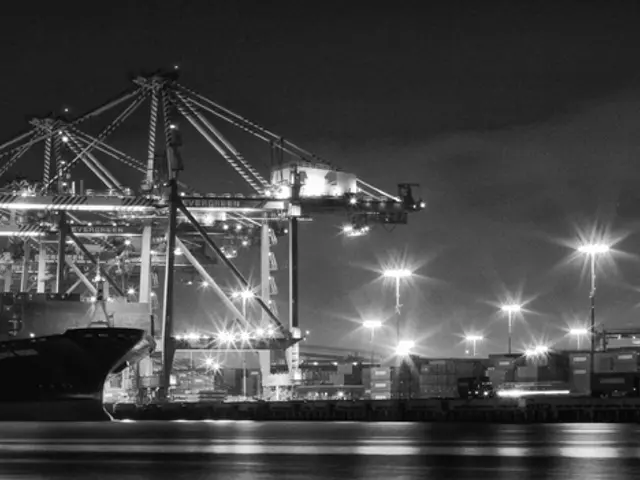Chat: Eric Robertsen Unveils Perspectives on Trump's Impact on Fed and ECB
standard chartered's chief strategist spills the beans on donald trump's influence on US and EU monetary policy
"Europe would experience significant impact from a trade war"
Donald Trump's return to the White House on January 20 might cause a stir in the monetary policies of the Fed and the ECB, predicts Eric Robertsen, the bigwig Chief Strategist of Standard Chartered. Robertsen thinks Trump's stance on tariffs is more flexible, open to negotiations.
Hey there! Here's a question - what's up with the Fed's interest rates in the next year with Trump back in the game, and all his job-boosting plans?
Well, it's tough to predict a drastic cut in interest rates. Higher tariffs, deregulation, and Trump's tax policies will bolster inflation. Considering the US economy's good health, I don't foresee a recession happening. So, the Fed would likely lower interest rates to a neutral level, keeping tabs on Trump's policies' impact on inflation, economic growth, and employment.
Say, what's your guess for the neutral interest rate?
I'd say the Fed Funds target range would be approximately 3.5 to 3.75% near the end of the cycle.
On immigrant policies, Trump announced some restrictions. How'd that hit the US labor market, which the Fed is keen on due to its dual mandate?
The government's focus on deporting criminal migrants is understandable. But I don't believe millions of migrants will be deported as announced. So, the effect on the labor market won't be severe.
You think Trump will go through with the announced tariffs, or maybe they'd be lower?
Trump will increase tariffs, but it won't reach the extreme levels in the most radical forecasts.
Christine Lagarde, ECB President, also considers Trump as someone open to negotiation on tariffs. Agree?
Absolutely. Throughout Trump's first term, we've seen him making high demands or threats, but always seeking a concession. With the announced tariffs against Mexico, he's putting pressure on the country to tighten border control. From Europe, he'd like to see increased military spending and more US gas imports.
What'll be the consequences if China or the EU retaliates with counter-tariffs on US tariffs?
An escalation of the conflict is bad news for everyone, including the US. Europe would be hit harder, as China can respond with a large fiscal stimulus it's been saving. Europe might not have the same financial muscle to counteract. Additionally, China might flood Europe with its goods, which could negatively impact European car manufacturers and potentially lower inflation in the Eurozone.
One possible outcome of US tariff policy might be a stronger dollar compared to the euro. What implications would that have?
The divide between interest rates could lead the euro to plummet in value, around 1.03 to 1.05. The question then arises whether the ECB will tolerate it or try to counteract it. A gradual depreciation might be acceptable, but more significant moves could force the ECB to act.
Germany is heading to fresh elections, and France is in a political turbulence. How concerned are you about political uncertainty, given the already questionable growth prospects in Europe?
Germany and France usually stabilize the EU, but they're not doing so right now. However, the economies in other Eurozone countries, like Spain, are running fairly smoothly. The challenge is maintaining this stability if the situations in Germany and France remain uncertain, potentially leading to a German recession.
What economic policies would you like to see the new German government implement?
Germany needs to invest more in infrastructure and create an environment that encourages businesses to invest and households to spend more. To achieve this, Germany should significantly reduce bureaucracy. Some may say it's impossible, but I don't think so. If Germany managed to reinvent itself in the 1990s with the Hartz reforms, it can do it again with the right political will.
Lastly, moving on to geopolitics, while conflicts are on the rise, BRICS gains new members in 2024. How does Robertsen envision BRICS' role in the future?
BRICS brings together states dissatisfied with the dominance of the USA and Europe. A massive portion of cross-border transactions currently involves dollars or euros, which bothers BRICS countries due to their resulting currency dependence. However, a BRICS currency remains a utopian idea. India will never jettison its stable currency for an unproven one. Instead, I see BRICS serving as a platform for countries seeking greater influence in global politics.
Should international organizations, such as the WTO, World Bank, or UN, be reformed to give the global South more say?
Absolutely. These organizations are crucial for diplomacy, but they're currently deadlocked by obstacles. Therefore, reforms are needed to provide the global South with more influence.
One nation making waves in international politics is India, with its booming economy. What's your economic outlook for India in the coming years?
India is a shining beacon of global growth. Different from China, India has a promising demographic landscape that works in its favor. The government has also made wise decisions in fiscal policy, investing heavily in infrastructure. Moreover, India's economy is relatively insulated from global trade disruptions, making it less dependent on global trade conflicts.
Regarding China, Robertsen pointed out its demographic challenges. How optimistic is he about China's economic prospects?
The Chinese government acknowledges the need for larger stimulus packages to reach its growth target. In 2025, a larger fiscal impulse is expected due to Trump. However, China is trending towards slower growth in the coming years. The troubled real estate market accounts for over 20% of GDP, while blooming sectors like the automotive market account for only around 6%. Therefore, the transition of the economy will take time.
Lastly, can China escape its deflation risk?
In thriving sectors like the automotive market, consolidation is expected, which could worsen the deflation problem. To overcome this issue, the Chinese government needs to boost private consumption and credit demand. This can be achieved by improving consumer and business sentiment. The key, in this case, is achieving significant improvement in sentiment.
- Eric Robertsen predicts that Donald Trump's return to the White House might lead to restructuring in the monetary policies of the Fed and ECB, with a possible increase in interest rates by the Fed, aiming for a neutral level.
- Robertsen suggests that Trump's policies, such as tariffs, deregulation, and tax policies, will likely bolster inflation, but not lead to a recession in the US economy.
- The impact of Trump's immigration policies on the US labor market is expected to be minimal, according to Robertsen.
- Robertsen anticipates a more moderate approach to tariffs from Trump, with negotiations being more likely, as shown by his stance on tariffs with Europe and Mexico.
- The consequences of a potential trade war between China or the EU and the US, as a result of US tariffs, could lead to a stronger dollar compared to the euro, causing the euro to plummet in value, potentially forcing the ECB to act.







